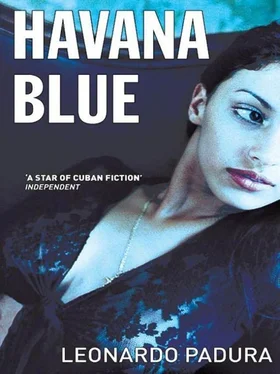“All right. Can I tune into some music?”
“Where did you get that aerial from?”
“If you’ve got friends…” He shrugged his shoulders and smiled. Switched on the car-radio and looked for a music programme. He tried two or three and finally plumped for “ Oh, vida ” sung by the pure voice of Benny Moré in a programme entirely devoted to his music.
“I think you’re exaggerating, Conde,” Manolo commented as they listened to “ Hoy como ayer ” and drove through the Plaza de la Revolución. “You may not like it but this is just another case, and you can’t spend your day going from one bad mood to another.”
“Manolo, my grandfather used to say ‘Born a donkey die a horse…’ That’s progress enough for me.”
“Lieutenant, the major says you should go to see him as soon as you get here. He’s up in his office,” said the duty officer, and the Count returned his salute.
On Sunday morning the peace and quiet in the street also permeated headquarters. All the routine cases, those which had gone on too long and didn’t look as if they’d ever be solved, those which followed normal procedures and were of no great import, were adjourned for the day, and the detectives disappeared and left headquarters eerily calm. Secretaries, office workers and researchers, identikit and forensic workers took the day off, and for twenty-four hours headquarters lost the stormy frenetic pace it had the rest of the week. Only those on permanent duty or engaged in urgent investigations were working in that building, which seemed bigger, darker and less human on Sunday mornings, when it was possible to hear the click of the dominoes with which the policemen condemned to guard duty attempted to relieve their boredom. Only the Boss had worked every Sunday for the last fifteen years: Major Rangel demanded that every thread in the fabrics being woven by his subordinates pass through his hands, and he followed the movement traced by each investigation with the passion of a man possessed, from Monday to Sunday. The Count knew that the warning from the duty officer was more than an order, it was a diktat from his chief, and he asked Manolo to look out the reports and expect him in the incubator in half an hour.
The peace in the building persuaded him he should wait for the lift. The lights indicated it was on its way down, fourth, third, second, and the door to the cage opened like the theatre curtain the Count always imagined, and he now practically collided with the man getting out.
“Maestro, weren’t you going to make Sunday a day of rest?”
Captain Jorrín smiled and slapped him on the shoulder.
“And what about yourself, Conde? You want to win a refrigerator?” he quipped as he took him by the arm and pulled him towards the Department of Information. The Count tried to explain the Boss was expecting him but told himself the major could wait.
“How’s your case going, Captain?”
“I think it’s going real well, Conde,” said Jorrín the veteran, almost smiling. “A witness has come forward who can probably identify one of the boy’s killers. We now know there were at least three and according to our witness they’re very young. We’re going to do the identikit portrait now.”
“You see, Maestro, there’s always light at the end of the tunnel, right?”
“Yes, I know. But that doesn’t solve everything… Just imagine if we finally get our hands on the murderers, and they turn out to be under eighteen. Already murderers, just imagine. That’s the real problem. It’s not just a boy who’s been kicked to death, but the fact that there are three others who will end up inside for a good few years and they’ll never become the people they should have turned into. They’re killers.”
The Count studied the wrinkles furrowing Captain Jorrín’s face and felt his arm in the desperate grip of a man who’d spent half a life hunting criminals.
“At the start I thought we’d react like doctors,” he said, staring him in the eye. “That with time we’d get used to the blood.”
“No, I hope that never happens. These things must hurt, Count. And if one day they don’t, that’s the time to give up.”
“Good luck, Maestro,” he said, opposite the Department of Information, and rushed off towards the staircase.
Maruchi’s table was also enjoying the Sunday magic: it was completely clean, and apparently sad and abandoned, without the flower the young woman brought daily. When he was by the office door he heard the major’s voice, knocked softly and heard him say: “Come on in.”
The Boss sat behind his desk, in civilian dress, wearing a grey-and-white striped pullover that emphasized his handsome chest and showed off his muscular neck. The major’s eyes pointed him to a chair while he continued on the phone. He was talking to his daughter; something was amiss, “Don’t be upset, Mirna, after all… All right, yes, phone your mother and tell her I’ll pick her up to go and have lunch with you, a good idea.” He added “give the kid a kiss from me, right” and hung up. All that time he spoke in a warm charming tone, never grumbled, the most pleasant sample the Count had ever heard from his broad repertoire of voices.
“What a bloody mess,” rasped the major after retrieving the Davidoff 5000 he’d just lit. “Another one who’s gone missing: my son-in-law. But we know where he is. He’s gone off with a nineteen-year-old bimbo. And my stupid daughter still loves him. Can you believe it? That’s why I don’t think I’ll ever retire. You can have a thousand problems here, staff problems, calls from on high, cases that prompt them, but I prefer this madhouse to being at home and having to sort out the hassles there. Do you know what Mirta, my other daughter, wants? You’ll never bloody imagine… She met an Austrian at university with hair down to here, who’s travelling the world saying there’s a hole in the ozone layer here and the sea’s being polluted there, and she says she’s going to marry him, that he’s the most sensitive man in the world and she’ll go anywhere to be with him. Do you know what that means? Well, I don’t even want to contemplate the prospect, but I can tell you one thing for nothing, Conde, she’ll not marry him. And now this business with my son-in-law.”
“I thought Austrians were an extinct species. Have you ever seen an Austrian?”
The major looked at his cigar.
“No, the truth is I’d never seen one before clapping my eyes on this fellow.”
The Count smiled, and although he wasn’t sure whether he should, he chanced his arm: “Look, just tell your daughters you have a lieutenant who’s available and single, a fine upstanding lad, with a good brain, who’s looking for a partner and better still if she’s the major’s daughter.”
“You know,” replied the Major, unsmiling, “that’s all I need… You know, it’s turned cold, hasn’t it?”
“Who told you to act the hero and wear only a pullover?”
“I left my coat in the car; I didn’t think it would be so bad. How’s your case going?”
“So, so.”
“Like how?”
“I don’t really know. We’ve got several leads, but only one going anywhere: we don’t know where Rafael Morín was on the afternoon and evening of the thirty-first. He told his wife he was going to his mother’s and his mother that he was going to the enterprise, and his secretary says the thirtieth was the last day they worked. We’re also investigating a woman he knew called Zoila and nobody knows where she’s been since the first. And the other lead is that it seems he was having an affair with his secretary.”
“And what if he lied so as to cover up what he was doing on the afternoon of the thirty-first because he was up to no good, and it’s got nothing to do with his disappearance?”
Читать дальше











